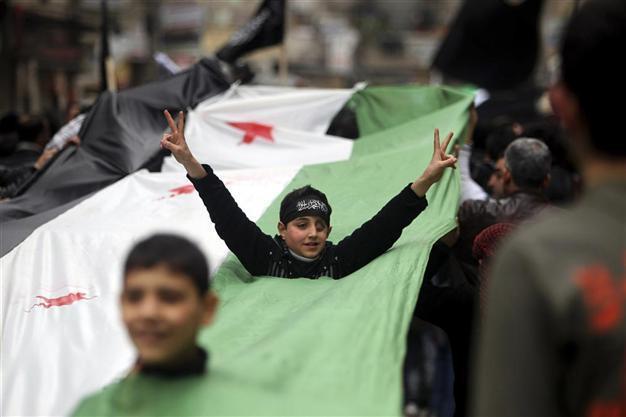Syria opposition govt will boost credibility: experts
BEIRUT - Agence France-Presse

A boy stands in the middle of a hole in a Syrian opposition flag during a protest against Syrian President Bashar al-Assad in the Bustan al-Qasr district of Aleppo February 22, 2013. The Arabic writing on his headscarf reads, "There is no God but Allah, Mohammad is Allah's messenger". REUTERS/Muzaffar Salman
Plans by Syria's opposition to form a government in rebel-held zones could help fill a security vacuum in areas where Islamists have the upper hand as well as bolster its global credibility, experts say.Syria's main opposition umbrella group, the National Coalition, announced on Friday it would set up a government to run areas of the country "liberated" by rebels and would meet in Istanbul on March 2 to name a prime minister.
"We agreed to form a government to run the affairs of the liberated areas," spokesman Walid al-Bunni told reporters in Cairo, adding it was expected such a government would be based in northern Syria, where the opposition controls vast swathes of territory.
The announcement comes as the opposition is accused by its detractors of being disconnected from the brutal reality of the conflict on the ground, with no solution in sight to the deadly nearly two-year war.
"The opposition wants to establish a presence which may well give them more credibility than they currently have," said Salman Shaikh, director of the Brookings Doha Centre.
"Right now, they don't have much credibility and they certainly don't have much presence. In both cases, it (a government) is to their advantage," he added.
The opposition has slammed the international community over its reluctance to intervene and halt slaughter in Syria where the UN says nearly 70,000 people have been killed since March 2011.
The Coalition has also cancelled plans to attend international meetings on Syria in Italy, the United States and Russia, saying they wanted action not words from Arab and Western countries to back their revolt against the Syrian regime.
Created amid much fanfare in November, the opposition coalition is recognised by most Arab and Western nations but it has been snubbed by powerful Islamist rebel group Al-Nusra Front.
Al-Nusra, which the United States lists as a terrorist organisation, has been at the forefront of fighting in the north and east of the country, where regime forces are losing control and basic services are lacking.
The group has also claimed a number of deadly car bombings in Damascus.
"There is a dramatic security vacuum and the opposition is aware of that," and realises "that the chaos is undermining its image," said Agnes Levallois, a Middle East expert based in France.
"It is important for the opposition to be on the ground so that it is not overrun by chaos and armed groups," in a post-Assad period, Levallois said.
Shaikh agreed and warned that with the influence of rebels growing, particularly that of Islamist insurgents, the vacuum will "develop and more dangerous elements will take advantage, and that is what is happening." "The Al-Nusra Front could well be controling de facto three provinces in the next stage," said Shaikh.
"Raqqa, Hassaka and Deir Ezzor are increasingly going to Al-Nusra Front," he said referring to three oil hubs in eastern Syria.
"They are doing the clever thing, establishing local agreements with tribal elders, administering some of the aid required and getting revenues by controlling some of the oilfields," Shaikh added.
Both Shaikh and Levallois agreed on the need for a provisional government, recognising however that the task facing the opposition is great.
"Different factions inside (the opposition coalition) are probably jockeying to put their people in key positions, even though it is supposed to be a government of technocrats," said Shaikh.
But the time is overdue for the opposition to act, and setting up a provisional government will force its supporters in the West and in the region to reciprocate and take action as well.
"It will force the (world) powers to shed this cynicism of making nice statements but falling short of helping to seal a solution," said Levallois.
The Syrian conflict has divided the international community.
The United States and the European Union have spearheaded demands on Assad to step down and thrown their support behind the opposition, but stopped short from arming it amid fears weapons could fall in Islamist hands.
On the other hand Russia, a traditional ally of Damascus, has blocked along with China several resolutions at the UN Security Council against Syria.
"They (opposition) may well realise that not many people will come to their help, and they will have to do it for themselves," said Shaikh.
For Levallois an opposition-run government could also organise the flow of humanitarian aid and create a "political interface" between donor nations and more than four million people inside Syria who the UN says are in dire need of aid.
















